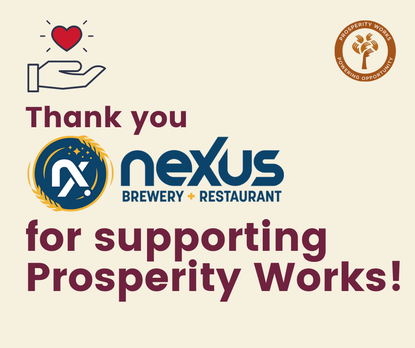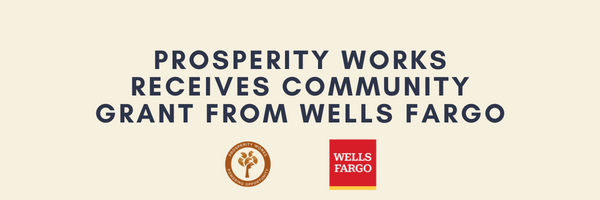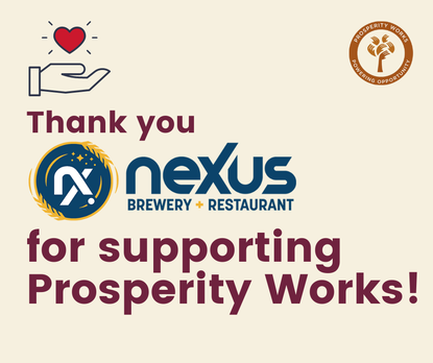0 Comments
Prosperity Works, Town of Bernalillo, City of Albuquerque, and more, celebrate Energy Equity Day1/18/2023
“Today we are excited to continue our work to address the unequal burden that energy costs place on lower-income households within the Town of Bernalillo after seeing great success with our program in Albuquerque, ” said Prosperity Works CEO, Dr. Ann Lyn Hall. “These energy upgrades will not only help lower bills for limited-income families but also allow them to focus on their health and financial freedom.” Through capital stacking and partnerships with local city governments, the PNM Good Neighborhood Fund, the New Mexico Gas Company, and EnergyWorks, Prosperity Works offers these energy efficiency upgrades at no cost to homeowners. “The Town is proud to announce our first-ever Energy Equity Day Celebration. Together with our partners at PNM, NM GAS CO., and Prosperity Works, we will provide resources to community members to improve the quality of life in their homes and help reduce costs and carbon emissions,” said Jack Torres, Mayor of Bernalillo. “We are grateful to these partners for offering these wonderful benefits to Bernalillo residents.” “We’re keeping equity in the front seat of our strategies outlined by the Climate Action Plan,” said City of Albuquerque Sustainability Officer, Kelsey Rader. “Our frontline communities face the highest energy burdens, and we are taking steps with our community partners to ensure equitable access to energy efficiency upgrades and more to build a climate resilient future for all.” About Prosperity Works Prosperity Works is an economic equity and justice organization that is best known for launching the first Individual Development Account initiative in New Mexico and for the award-winning Prosperity Kids program. The organization is committed to fighting for greater financial inclusion and opportunity for all New Mexicans. Key areas of advocacy include providing equitable access to renewable energy for income-restricted families, bringing awareness to community programs and organizations designed to help limited-income individuals, and developing financial capability training and coaching for all New Mexicans. Prosperity Works is excited to announce a $125,000 investment from Wells Fargo to help New Mexicans grow assets through matched savings accounts. These accounts can be used to purchase or repair a home, to grow a business, to attend college or to buy a car to get to work. We are grateful to our partners at Wells Fargo for their ongoing commitment to Prosperity Works. The funds received will be used to serve limited-income individuals in New Mexico with a focus on indigenous communities and rural areas of the state.
"We are excited and so grateful for the generous support from Wells Fargo to expand assets for New Mexicans through our individual development account program," said Dr. Ann Lyn Hall, CEO of Prosperity Works. Tim Rios, Senior Vice President, Rural Strategy Leader at Wells Fargo is a strong advocate for asset-building strategies that lift up rural communities. Without the help of Lauren Hornett, VP of Senior Social Impact Specialist, and Katie Rollyson, VP of Social Impact and Sustainability Specialist, Prosperity Works wouldn’t be able to reach into these communities and help individuals in need. “We are proud to support Prosperity Works’ efforts to ensure New Mexicans have access to opportunities, knowledge, and assistance they need to achieve economic prosperity,” said Lauren Hornett, Wells Fargo Vice President and Senior Social Impact Specialist. Stay up to date with what our partners are doing by following us on social media. You can also learn more about our IDA program here. BY SARA GERSEN, SENIOR ATTORNEY and ONA PORTER, GUEST CONTRIBUTOR To expand at-home charging for low- and moderate-income electric vehicle drivers, New Mexico shines a guiding light. Although early adopters of electric vehicles paid a high premium for cleaner cars, today’s electric car drivers often save money. Over their vehicles’ lifetimes, it costs much less to fuel and maintain electric cars than their gas-guzzling competition. In just a few years, experts expect the sticker price of an electric car will be lower than that of a comparable gas car. This means customers who purchase electric cars could save money from day one and thousands more in the coming years--if they have the charging infrastructure they need to fuel up on low-cost electricity. Making sure all drivers have access to low-cost vehicle charging is essential to relieving the disproportionate cost burdens of transportation on low- and middle-income families. The New Mexico Public Regulation Commission recently approved a suite of programs that will allow the state’s investor-owned utilities to support charging infrastructure in single-family and multi-family homes, workplaces, and other public places, as well as charging infrastructure for transit and school buses. In the coming years, massive deployments of infrastructure will be necessary to support electric vehicles in all of these settings. Earthjustice represented Prosperity Works and drew on Prosperity Works’ decades of experience with low-income energy efficiency programs to identify strategies that will help ensure these programs will be accessible to the families that need them most. To implement best practices from these energy efficiency programs, policymakers should apply the following key principles to electric vehicle programs that help low- and moderate-income customers install chargers at home:
SARA GERSEN - Sara Gersen is a Clean Energy senior attorney. She is based in Los Angeles.
ONA PORTER - Ona is the Founder Emerita & Clean Energy Leader at Prosperity Works. CLEAN ENERGY PROGRAM - Earthjustice’s Clean Energy Program uses the power of the law and the strength of partnership to accelerate the transition to 100% clean energy. Read the original article on Earthjustice's website here.
“I have been a fan of Prosperity Works for many years and I am very excited to join the Prosperity Works team to support the mission of economic prosperity for all New Mexicans,” commented Ms. Hall. “I am eager to work with the Prosperity Works Board and partners to continue to build on the compelling outcomes that Prosperity Works has achieved over the years. I am overjoyed to get to work with a leader of the caliber and reputation like Ona Porter.”
Prosperity Works utilizes a dual-pronged anti-poverty tack that includes "out of poverty" and "ending poverty" strategies. Out of poverty strategies connect individuals and families with change-making assets—such as Child Savings Accounts, Individual Development Accounts, financial capability training, and sustainable household energy assistance. Ending poverty strategies involve policy advocacy to remove barriers to opportunity that limit the asset-building capacity of historically marginalized communities, such as predatory lending. “We owe a great deal of gratitude to Ona Porter, who has worked tirelessly on behalf of communities across New Mexico to ensure that all residents can prosper and thrive”, Abeyta commented. Ms. Porter will continue to lead on sustainable household energy efforts at Prosperity Works. PNM can invest $10 million in a suite of electric vehicle programs, with more than $3 million targeting low- and moderate-income families, a promising first step for delivering the economic and health benefits of electric vehicles to all New Mexicans. The Public Regulation Commission also authorized EPE to invest more than $1.2 million in electric vehicle infrastructure and education in its southern New Mexico territory.
SANTA FE, N.M. (Nov. 10, 2021) – Today, the New Mexico Public Regulation Commission approved transportation electrification plans for Public Service Company of New Mexico (PNM) and El Paso Electric (EPE) to accelerate the deployment of electric vehicles over the next two years. The plans will help fund charging equipment at single-family and multi-family homes, workplaces, other public places, including 70 fast chargers in PNM’s territory and 16 DCFC chargers in EPE’s territory. A goal of the plans is to assist closing gaps in areas that do not have charging stations to enable EVs to travel longer distances, for example between Las Cruces and Albuquerque. Low-income customers in both territories will be eligible for incentives that cover the entire cost of installing chargers at customer’s homes. PNM will invest up to $1.5 million to install charging infrastructure for electric transit buses and school buses in underserved communities and $1 million educating customers about electric vehicles. This will include a partnership with a community-based organization to conduct tailored outreach to low- and moderate-income customers. EPE will invest up to almost $150,000 in low-income smart charging, over $100,000 in public transit and customer fleet smart charging, and $250,000 for customer outreach and education about EVs, charging infrastructure, and customer incentives. Ona Porter, CEO at Prosperity Works said, “We appreciate that today’s Commission decisions strongly affirm our belief that we cannot reach our carbon reduction goals without the inclusion of low-moderate income residents in the deployment of ALL of the new technologies, and equally important, that these populations must be the beneficiaries of the reduced costs and improved health that they offer right alongside of their more affluent neighbors.” Increasing access to electric vehicles is especially important for low- and moderate-income families because electric vehicles save their owners thousands of dollars in fuel and maintenance costs. For residential customers, the cost of fueling an electric car is roughly equivalent to paying $1 per gallon of gasoline. New Mexico utilities serve low-income, rural areas where the average family currently devotes more than a third of its household income to transportation costs. “Ditching a gas guzzler for a clean electric vehicle is a lot easier if you can recharge your car at home, so I’m glad the Public Regulation Commission approved a program that can unlock the financial and health benefits of electric vehicles for more low- and moderate-income families in New Mexico,” said Earthjustice senior attorney Sara Gersen, who represented Prosperity Works before the Commission. Electrifying fleets of city buses, school buses, and other vehicles that burn diesel will provide essential public health benefits. Diesel exhaust is far more toxic than gasoline exhaust and disproportionately burdens low-income communities. PNM estimates that its program could support about 20 charging stations for buses. This is an important step in the right direction but dramatically increased investments will be necessary to electrify all the diesel-burning vehicles in PNM’s territory, which includes the metro Albuquerque area. “Installing EV charging infrastructure so that average folks can access it is critical to helping our state drive down GHG emissions and harmful pollutants,” said Cara Lynch attorney for CCAE and Prosperity Works. “These programs are a positive first step to helping New Mexico’s families and low-income customers access EV charging. Overall, this can result in meaningful energy savings for families.” New Mexico cannot meet its climate goals without a widespread transition to electric vehicles. Governor Lujan Grisham established a goal of reducing the state’s climate pollution by 45% by 2030. Transportation is New Mexico’s second largest source of greenhouse gas emissions — exceeded only by the oil and gas industry. Currently, fewer than 0.2% of vehicles registered in New Mexico are electric. “The New Mexico PRC’s approval is another indicator that the state is making big strides toward an all-electric transportation future. Lack of access to charging infrastructure continues to be one of the biggest barriers to widespread EV adoption, and the PNM and EPE plans will be critical to increasing availability and encouraging more New Mexicans to go electric,” adds Aaron Kressig, transportation electrification manager at Western Resource Advocates. “It is encouraging to see that the Commission approved of plans that were more ambitious than the utilities originally proposed. They clearly responded to input from stakeholders who urged them to go even further and demonstrates that the New Mexico government understands that ambitious plans are necessary to meet the climate and air quality challenges of our time.” In July 2021, the New Mexico Environment Department and the City of Albuquerque launched a rulemaking process that will lead to the adoption of standards that require auto manufacturers to sell electric vehicles and low emission vehicles in New Mexico. Increasing sales of electric vehicles will improve public health by helping New Mexico meet air quality standards, while allowing New Mexico to reach our climate goals. These rules are also essential for making more electric vehicles available in the state and creating a market for used electric vehicles. “This is a big step toward a cleaner, more efficient transportation system for New Mexico,” said Travis Madsen, Transportation Program Director at the Southwest Energy Efficiency Project (SWEEP). “There’s something for everyone to like in this decision. It will save New Mexicans millions of dollars. At the same time, it will help clean up our air, protect our health and reduce climate change.” Electrifying passenger vehicles on the trajectory needed to reach New Mexico’s climate goals will save drivers $20 billion through 2050, save utility customers almost $5 billion over the next 30 years in the form of reduced electricity bills, and prevent climate-changing pollution with a social value of $5 billion, according to a report commissioned by SWEEP and NRDC. The New Mexico Legislature initiated this process in 2019, when it passed House Bill 19-521. The law directs investor-owned utilities to file transportation electrification plans for approval with the Public Regulation Commission on a regular basis. ### Prosperity Works builds the capacity of organizations and advocates for policies that generate economic prosperity for all New Mexicans. Earthjustice is the premier nonprofit environmental law organization. We wield the power of law and the strength of partnership to protect people’s health, to preserve magnificent places and wildlife, to advance clean energy, and to combat climate change. We are here because the earth needs a good lawyer. Western Resource Advocates provides on the ground solutions to climate change. WRA works with policymakers and other advocates to advance clean energy; protect air, land, water, and wildlife; and sustain the lives and livelihoods of the West. For more information, visit westernresourceadvocates.org and follow us on Twitter @wradv and #ProtectTheWest. CCAE uses strategic advocacy, scientific analysis, and grassroots organizing to advance clean energy policy and programs With New Mexico's 2021 Legislative Session underway, Prosperity Works has been advocating in collaboration with the New Mexicans for Fair Lending Coalition for proactive legislative action that centers limited-income (LI) households. We are excited that Senate Bill 66 includes an all-inclusive 36% interest rate cap and strongly support it.
For LI individuals, or those without a developed credit history, the savings offered by employer-based lending models—such as the TrueConnect program with which Prosperity Works partners—and equitable loans can mean the difference between financial security and financial ruin. Loans made at the current interest rate cap of 175% can quickly thrust LI borrowers into an inescapable debt trap. New Mexico has one of the highest interest rate caps on storefront loans in the country, and more than 85% of high-interest lenders in New Mexico are subsidiaries of large, out-of-state companies. Moreover, triple digit interest rates hit communities of color and members of Tribes and Pueblos the hardest; 65% of lenders in New Mexico are located within 15 miles of Native populations. Hundreds of millions of dollars are being extracted from LI families and leaving our state each year because of predatory lenders. Reducing the interest rate cap from 175% to an all-inclusive 36% is timelier than ever—as is embracing more equitable lending alternatives, like TrueConnect, for large-scale employers. Employers across New Mexico have adopted TrueConnect, including:
With no cost or risk to the employer and no credit check for the employee, these payroll-deduction loans of up to $5,000 have helped employees address short-term emergencies and reduce financial stress—and many are offered at far less than 36% APR. Reducing the interest rate cap to an all-inclusive 36% is an equitable path toward helping ensure the socioeconomic solvency of LI households across New Mexico, especially as we collectively rebuild our state post-COVID. In the wake of the attempted coup in our nation's Capitol this week, and the ongoing attempts by complicit members of Congress and domestic terrorists to undermine the democratic process amid a global pandemic, state power—forged at the community level—is all the more important.
Like many other states working to counter the pandemic’s social and economic effects, New Mexico is entering a legislative session wherein our values as a state will translate through policy and budgetary decisions. During the 2021 legislative session, Prosperity Works will be advocating in collaboration with the New Mexicans for Fair Lending Coalition to reduce the interest rate cap for short-term loans from 175% to 36%—to pave the way for more equitable lending alternatives to high-interest, predatory storefront lenders. As Prosperity Works pivots into 2021, we’re reminded—as so many are at the national level—that community-driven people power is the basis for systems change. In the context of COVID, and in adapting to meet the growing needs of our community partners, Prosperity Works will be intentionally repackaging our initiative suite—inclusive of Individual Development Accounts, Child Savings Accounts, Fair Lending Options, and financial capability training and coaching—as we deploy our asset-building resources to reach more limited-income (LI) households statewide. In adapting and growing our work, we remain committed to elevating, amplifying, and centering community voices. We will continue to work in solidarity with our partners in progress to build the socioeconomic assets of LI households across our state; to close the health and wealth gaps exacerbated by the pandemic; and to keep capital—and talent—in New Mexico communities. This means being explicit about the intersections between race and economic opportunity, and also being proactive in meeting the needs of our neighbors who have historically faced barriers to accessing asset-building resources—especially Black, Indigenous, and People of Color communities. Together with our community partners, Prosperity Works will continue to innovate creative solutions to clear the hurdles COVID has placed in our collective path as we work to honor the changemakers New Mexico communities have lost—to incubate intentional, authentic community rebuilding efforts across our state as we, as a nation, move forward to shape a more equitable future. On the heels of a tumultuous 2020—during which we experienced the culmination of systems-level racial, economic, and environmental inequities being laid bare—the nation is entering 2021 with new federal leadership, in both the White House and Congress.
But as we witness the depth to which the nation’s democratic process is being undermined—both by complicit members within Congress, and by domestic terrorists—we recognize that there is much work to be done to counter the impact of misinformation at all levels of government. At a time when the country is reeling from disasters, it is incumbent on each of us to advocate for equitable, just outcomes—at both the systems and community levels. “Today’s events in our nation’s Capitol are unsettling,” said Arellana Cordero, Prosperity Works’ President & CEO. “We’re grateful to all who are advocating for equity and justice, and for those that put themselves in peril to protect our nation through today’s violence. Prosperity Works joins our fellow partners in progress in pursuing unifying, equitable solutions as we all work together to rebuild our communities.” Prosperity Works remains in solidarity with our neighbors who are put most at risk by these violent acts and proclamations—specifically Black, Indigenous, People of Color households. Our fight for equity and justice continues. As Prosperity Works pivots into 2021 and assesses community needs, we have identified how we can adapt to meet growing resource requests from our network of statewide, community-embedded partners and reach more rural communities with our asset-building initiatives. To this end, during the first months of 2021, we'll be unveiling a phased approach about how we'll be responding to community needs.
Within the context of COVID-19 and its affiliated economic fallout, we've been consistently reminded of Prosperity Works' founding tenet: navigating life without assets is challenging and unpredictable--and exacerbated by systemic racial inequities. Assets help stabilize families, enhance household health, increase agency, and strengthen communities. With the inextricable linkages between racial and economic inequities laid bare--even more pointedly over the course of 2020--we've recognized that it is incumbent on us as an organization to explicitly name the barriers that prevent limited-income (LI) New Mexico households from achieving socioeconomic prosperity. As we did when Prosperity Works was founded over 20 years ago, we also hold this guiding truth: prosperity for all New Mexicans cannot be brought to fruition without changing systems, attitudes, and behaviors. And we continue to believe that direct, high-impact investments in hardworking, committed individuals and families are the best investment you can make. So, as we forecast the work that needs to be done in 2021 to support LI communities, we remain steadfast in our dedication to do so intentionally and authentically--with our proactively innovative, community-centered solutions cast through an intergenerational, intersectional lens that centers racial equity. Together, we will ensure 2021 is a year where we make concerted headway toward closing the health and wealth gaps in New Mexico--gaps that the pandemic and its economic downturn have widened exponentially. But we will bridge those daunting gulfs together--through innovative, asset-focused solutions that seek to rebuild the identity and cultural anchors communities have lost, and to incubate and cultivate contingents of changemakers galvanized to effect meaningful, lasting, equitable change alongside their neighbors. |
AuthorProsperity Works Staff CategoriesArchives
November 2023
|
Call Us:
(505) 217-2747
Email Us:
[email protected]
|
Prosperity Works is a 501(c)(3) organization dedicated to supporting limited-income New Mexicans build and protect assets they need to be successful. Whether that's investing in education, providing low-interest lending options.
|
© 2024 Prosperity Works. All Rights Reserved.






